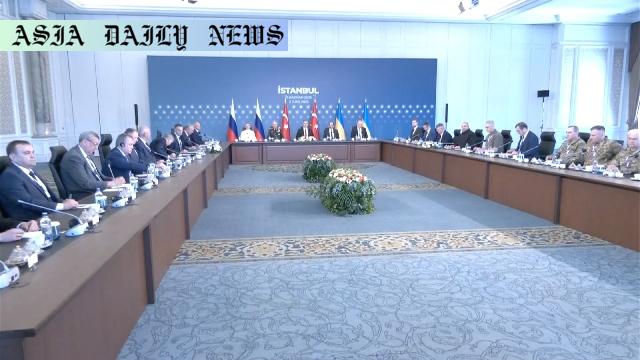Peace Talks: Delegates from Russia and Ukraine engage in Istanbul for their second round of face-to-face peace negotiations.
Delegates from Russia and Ukraine meet in Istanbul for second round of peace talks.
Turkey mediates discussions amidst intensified fighting in Ukraine’s east.
Both sides present differing conditions for a peace resolution.

Introduction
Delegates from Ukraine and Russia convened in Istanbul for the second round of direct peace talks, signifying renewed efforts to address the ongoing conflict that has devastated lives and infrastructure. Hosted by Turkey, this meeting marks a pivotal step as the first round of discussions in May failed to produce concrete outcomes. Both parties bring forth memorandums outlining their conditions for peace, with stark differences in priorities, making this round of talks extremely vital.
Key Figures and Topics
The discussions are led by high-ranking government officials from both nations—Vladimir Medinsky, representing Russia, and Rustem Umerov, representing Ukraine. Turkish Foreign Minister Hakan Fidan also participates as a mediator, reflecting Turkey’s commitment to fostering peace in the region. The dialogue centers on potential resolutions, with Russia pressing for troop withdrawals in areas it claims to have annexed and Ukraine demanding a complete ceasefire alongside summit-level talks for a lasting resolution. These opposing stances underscore the difficulties of reaching consensus amid continuous military confrontations.
The Escalating Violence
While dialogue indicates a willingness toward peace, the battlefield reality remains grim. Russian forces have intensified operations in eastern Ukraine, contributing to rising casualties. Simultaneously, Ukrainian forces have reportedly launched aggressive measures, including drone strikes on Russian airfields, causing significant damage to 41 aircraft, including strategic bombers. Such incidents paint a complex picture, as ongoing hostilities threaten to undermine goodwill fostered in Istanbul.
Turkey’s Role in Mediation
Turkey has emerged as a critical player in mediating the Russia-Ukraine dialogue. Hosting these high-stakes discussions, Turkey attempts to bridge the considerable gap between the two nations. Turkish Foreign Minister Hakan Fidan’s presence underscores Ankara’s responsibility to facilitate meaningful solutions that could end months of devastation. Turkey’s diplomatic stance highlights its long-term commitment to stability, not only for the region but also in terms of its global standing.
The Challenges in Negotiating Peace
The path to peace is far from straightforward. With both sides deeply entrenched in differing positions, significant compromises are required. Russia’s insistence on territorial control of areas in Ukraine clashes with Ukraine’s resolute demand for sovereignty and cessation of hostilities. The lack of immediate trust between nations complicates dialogue. As such, the global community remains hopeful yet skeptical about this round of negotiations yielding lasting resolutions.
Conclusion
The second round of peace talks in Istanbul holds immense significance amidst mounting tensions and relentless warfare. While both Russia and Ukraine have shown willingness to engage in dialogue, the outcome largely hinges on their ability to make concessions. International observers and mediating nations such as Turkey are closely monitoring the proceedings, as success in Istanbul could represent a turning point in the trajectory of this crisis. Nonetheless, intensifying military operations near the borders highlight the fragility of peace efforts.



Commentary
The Need for Diplomacy in Conflict Zones
The second round of peace talks between Ukraine and Russia in Istanbul is a vital reminder of the importance of diplomacy, particularly in times of conflict. Negotiations are often the only avenue to address deeply-rooted issues and foster long-lasting solutions. Both nations have a duty to their civilians and the broader international community to pursue peace with conviction and sincerity. Such talks serve as a beacon of hope amid the harrowing reality of war.
Turkey’s Role as a Mediator
Turkey’s role as a mediator highlights the responsibility of neutral nations in resolving regional or global conflicts. By hosting these talks, Turkey demonstrates its ability to contribute meaningfully to international peace efforts. As a country strategically positioned between Europe and Asia, Turkey thrives on geopolitical relevance, and its willingness to mediate underscores its dedicated stance toward global stability and peace. Successful mediation could further elevate its reputation on the world stage.
The Potential Impact of a Peace Agreement
A peace agreement between Russia and Ukraine could yield transformative effects, not just for the warring nations but for global politics and economics. It could restore stability in Eastern Europe, reduce global tensions, and pave the way for reconstruction efforts. However, any agreement must be built on mutual respect and compromise, addressing core grievances while ensuring sovereignty and regional security. The world watches with bated breath, hoping that the leadership in Istanbul rises to the occasion.